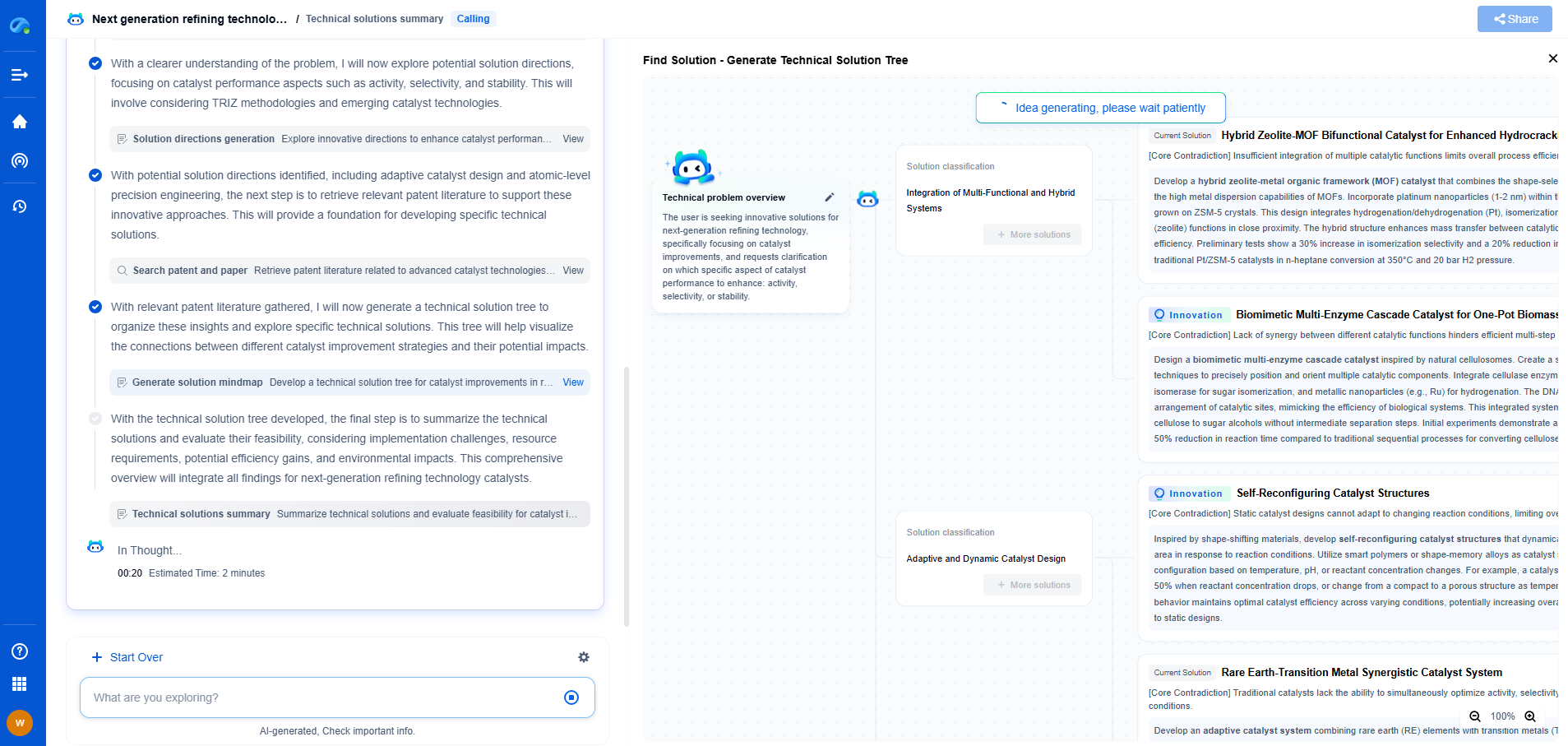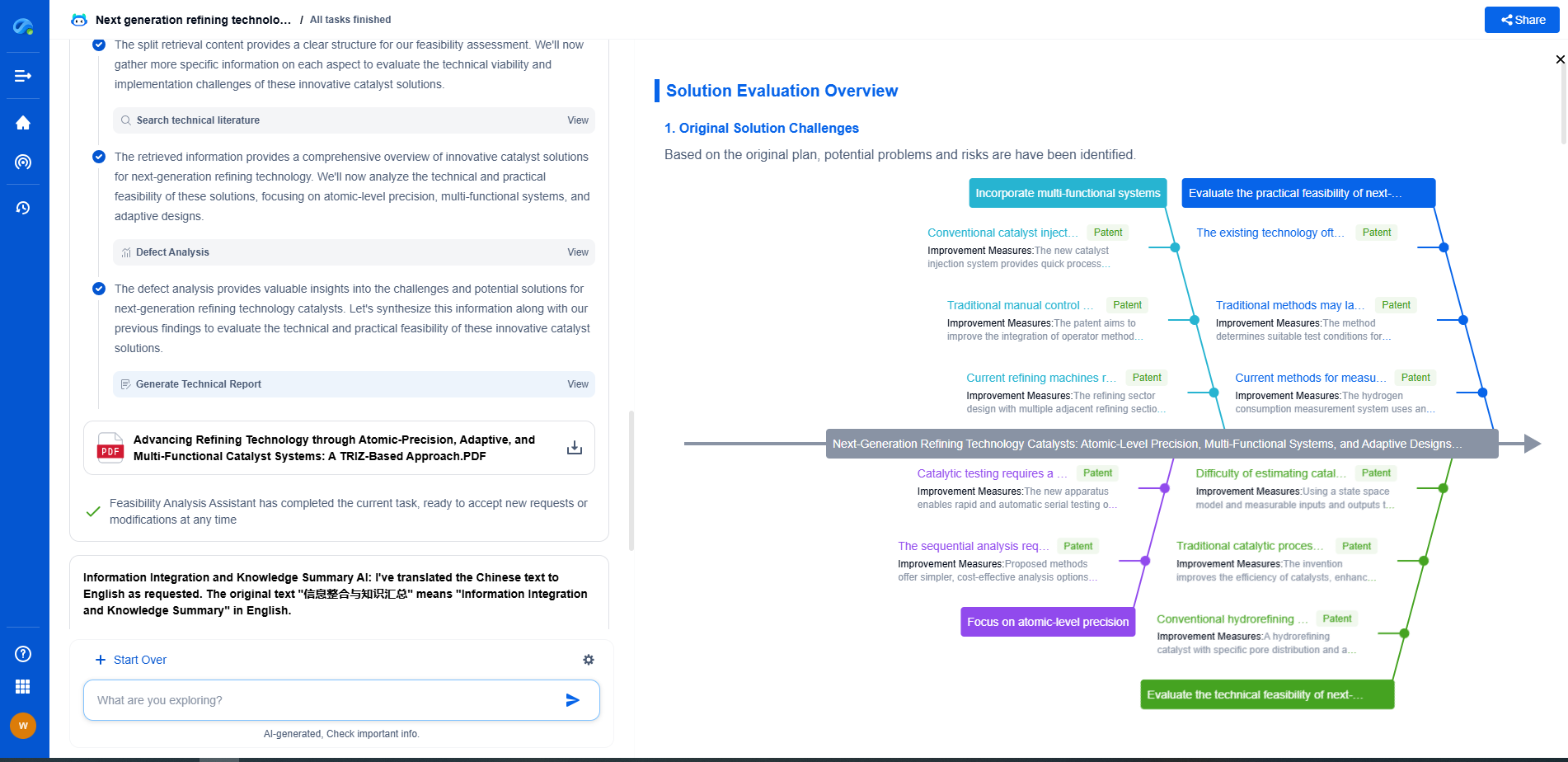What is Process Control in Chemical Plants? Key Components & Challenges
JUL 2, 2025 |
Process control in chemical plants refers to the systematic approach used to manage and regulate the processes involved in the production of chemical products. The primary objective is to ensure that the processes are efficient, safe, and produce products of consistent quality. Effective process control is vital given the complexity and potential hazards associated with chemical production.
Key Components of Process Control
1. Sensors and Transmitters
Sensors are critical in process control systems as they measure various process variables such as temperature, pressure, flow rates, and chemical composition. These measurements are then converted into signals by transmitters, which are sent to control systems for analysis.
2. Control Loops and Controllers
Control loops are the backbone of process control systems. Each loop comprises a sensor, a controller, and a final control element. Controllers compare the measured value from the sensor with a desired setpoint and calculate any necessary adjustments. Common types of controllers include Proportional-Integral-Derivative (PID) controllers, which are widely used due to their ability to handle complex process dynamics.
3. Final Control Elements
The final control elements, such as valves, pumps, and actuators, are responsible for implementing the changes dictated by the controllers. They adjust the flow of materials, alter temperatures, or change pressures to maintain the desired process conditions.
4. Human-Machine Interface (HMI)
The HMI provides a visual representation of the processes and allows operators to monitor and control the system. It offers real-time data on process conditions and system performance, enabling operators to make informed decisions quickly.
5. Distributed Control Systems (DCS)
DCS is a specialized control system used in chemical plants to integrate and automate complex processes. It distributes control functions across various subsystems, enhancing reliability and efficiency. DCS enables coordinated control and real-time monitoring, which are crucial for maintaining process stability.
Challenges in Process Control
1. Process Complexity
Chemical plants often involve numerous interconnected processes, each with its own set of variables and dynamics. Managing the interactions between these processes can be challenging, requiring sophisticated control strategies to ensure overall system stability and performance.
2. Safety Concerns
Safety is a paramount concern in chemical plants due to the potential hazards associated with chemical reactions and the handling of hazardous materials. Process control systems must be robust and fail-safe to prevent incidents that could lead to equipment damage, environmental harm, or human injury.
3. Dynamic Changes
Processes in chemical plants are subject to various dynamic changes, such as fluctuations in feedstock quality, ambient conditions, and equipment performance. Controllers must be able to adapt to these changes to maintain process efficiency and product quality.
4. Technological Advancements
The rapid pace of technological advancements presents both opportunities and challenges for process control. While new technologies can enhance control capabilities, they also require continuous learning and adaptation by operators and engineers.
5. Integration of Advanced Technologies
The integration of advanced technologies such as artificial intelligence, machine learning, and the Internet of Things (IoT) is becoming increasingly common in process control systems. These technologies offer enhanced predictive capabilities and optimization potential but require careful implementation to ensure compatibility with existing systems.
Conclusion
Process control in chemical plants is a critical component that ensures efficient, safe, and reliable production. By understanding the key components and challenges associated with process control, chemical plants can optimize their operations, meet safety standards, and produce high-quality products consistently. As technology continues to evolve, the field of process control will undoubtedly advance, offering new possibilities for innovation and improvement in chemical manufacturing.
Ready to Reinvent How You Work on Control Systems?
Designing, analyzing, and optimizing control systems involves complex decision-making, from selecting the right sensor configurations to ensuring robust fault tolerance and interoperability. If you’re spending countless hours digging through documentation, standards, patents, or simulation results — it's time for a smarter way to work.
Patsnap Eureka is your intelligent AI Agent, purpose-built for R&D and IP professionals in high-tech industries. Whether you're developing next-gen motion controllers, debugging signal integrity issues, or navigating complex regulatory and patent landscapes in industrial automation, Eureka helps you cut through technical noise and surface the insights that matter—faster.
👉 Experience Patsnap Eureka today — Power up your Control Systems innovation with AI intelligence built for engineers and IP minds.
- R&D
- Intellectual Property
- Life Sciences
- Materials
- Tech Scout
- Unparalleled Data Quality
- Higher Quality Content
- 60% Fewer Hallucinations
Browse by: Latest US Patents, China's latest patents, Technical Efficacy Thesaurus, Application Domain, Technology Topic, Popular Technical Reports.
© 2025 PatSnap. All rights reserved.Legal|Privacy policy|Modern Slavery Act Transparency Statement|Sitemap|About US| Contact US: help@patsnap.com

